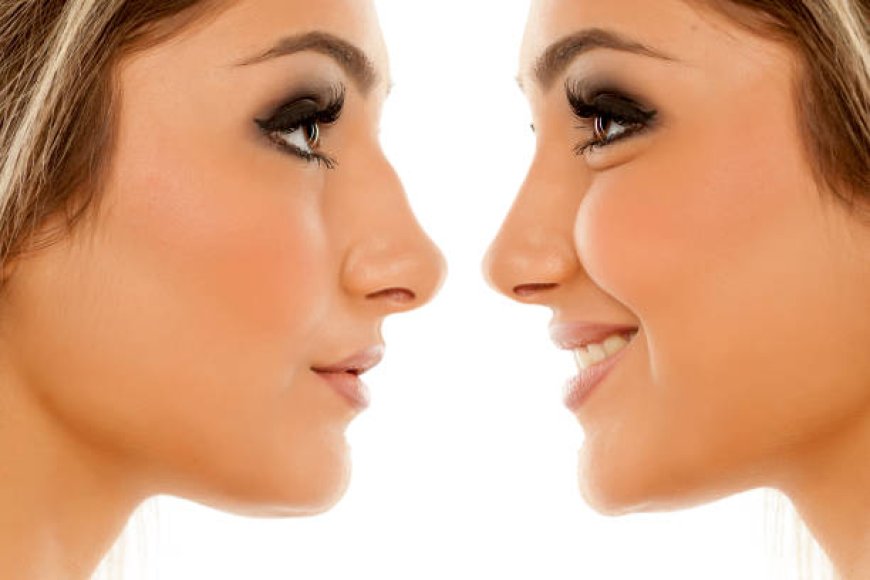Does Rhinoplasty Affect Your Voice? Myth vs. Reality
Rhinoplasty, commonly referred to as a "nose job," is a popular cosmetic surgery aimed at improving the appearance or function of the nose. While most people are aware of the aesthetic benefits of rhinoplasty, many are curious about its potential effects on other aspects of their appearance and health.

Rhinoplasty, commonly referred to as a "nose job," is a popular cosmetic surgery aimed at improving the appearance or function of the nose. While most people are aware of the aesthetic benefits of rhinoplasty, many are curious about its potential effects on other aspects of their appearance and health. One common concern is whether rhinoplasty can affect the voice. Some individuals fear that altering the structure of the nose may change how they sound when speaking or singing. However, the reality is more complex. In this blog, we will debunk the myth that Rhinoplasty in Islamabad negatively affects your voice and discuss the factors that influence vocal changes after surgery.
Understanding the Role of the Nose in Voice Production
To understand how rhinoplasty might affect your voice, it's essential to first understand the role the nose plays in voice production. The nose functions as a resonating chamber for the voice, affecting the sound quality, tone, and resonance. The nasal passages help amplify certain frequencies and contribute to the overall character of a person's voice. This is why a stuffy nose, sinus congestion, or a blocked nasal passage can cause someone to sound "nasally" or congested.
However, the nose is not the sole factor in determining the quality of a person's voice. The vocal cords, diaphragm, mouth, and other components of the respiratory and phonatory systems play a far more significant role in how we sound. Therefore, a well-performed rhinoplasty should not drastically change the tone or pitch of your voice.
Myths Surrounding Rhinoplasty and Voice Changes
There are several myths about rhinoplasty affecting the voice, often stemming from exaggerated fears or misunderstandings. Let’s take a closer look at some of the most common myths and clear them up:
Myth 1: Rhinoplasty Will Change the Tone of Your Voice Forever
One of the most common misconceptions is that rhinoplasty will permanently alter the tone of your voice, making it higher, lower, or more nasal. This is not true. While the surgery may temporarily affect the resonance of the voice due to swelling or changes in nasal airflow, these effects are usually temporary and resolve within a few weeks as the body heals.
In rare cases, individuals who undergo extensive nasal surgery to address structural issues may notice slight changes in resonance. However, this is typically minimal and does not drastically alter one's voice. A properly executed rhinoplasty focuses on enhancing the aesthetics of the nose without interfering with the voice box (larynx) or vocal cords.
Myth 2: Rhinoplasty Will Make You Sound Nasal or Congested
Some people worry that rhinoplasty will result in a "stuffed-up" or nasal-sounding voice. This fear is understandable, as nasal surgeries can lead to temporary congestion or swelling. However, rhinoplasty is designed to enhance the airflow and function of the nose, not to restrict it. Any slight nasal-sounding voice changes you experience post-surgery will generally be short-lived and resolve as the swelling decreases.
In fact, many patients report that after rhinoplasty, they actually experience improved breathing and airflow, which could make their voice sound clearer and more resonant in the long term.
Myth 3: Only Professional Singers Should Avoid Rhinoplasty
There is a prevalent belief that professional singers or voice actors should avoid rhinoplasty because it might change their singing voice. While it is true that rhinoplasty can affect vocal resonance, it’s essential to recognize that the voice itself is not primarily produced in the nose. Singers who undergo rhinoplasty typically do not experience any lasting damage to their vocal performance. In some cases, rhinoplasty can even improve airflow and breathing, allowing the singer to perform with better vocal control.
As with any surgery, professional singers are advised to consult with their surgeon beforehand to discuss their concerns and ensure the procedure is tailored to their needs.
When Does Rhinoplasty Affect the Voice?
While rhinoplasty generally does not cause any permanent changes to the voice, there are a few situations where temporary effects can occur. These effects are usually short-lived and resolve as the body heals.
1. Swelling and Inflammation
After rhinoplasty, the nose and surrounding areas may swell, and the nasal passages may become temporarily blocked or congested. This can cause a slight change in the way you sound while speaking, as the airflow through the nose is momentarily disrupted. The good news is that these changes are temporary, and once the swelling subsides, your voice will return to its usual tone.
2. Breathing Changes
Rhinoplasty can improve nasal breathing, which may result in a more open and unrestricted airway. In some cases, individuals may find that their voice sounds clearer and more resonant after recovery due to improved airflow. This is especially true for those who had previous nasal obstructions or breathing difficulties before the surgery.
3. Psychological Effects
After undergoing rhinoplasty, some individuals may feel more self-conscious or aware of their voice due to the changes in their appearance. This increased awareness can lead to a perception of vocal changes, even if no significant alterations have occurred. It’s essential to give yourself time to adjust to the new shape of your nose and feel comfortable in your voice once again.
Factors That Influence Vocal Changes Post-Rhinoplasty
There are several factors that can contribute to the way your voice might change after rhinoplasty, including:
1. Type of Rhinoplasty Procedure
The extent of rhinoplasty can influence how the voice is affected. If the surgery is relatively minor, such as addressing a small bump on the nose or performing a tip refinement, you are less likely to experience any significant voice changes. However, more extensive procedures, such as those that involve the nasal septum or airway reconstruction, may lead to temporary changes in voice resonance as the nasal passages heal.
2. Healing Process
The recovery period after rhinoplasty is crucial to the restoration of normal voice function. If you experience significant swelling or nasal congestion during the recovery phase, this could temporarily affect your voice. As the swelling goes down and the nasal passages clear, your voice should return to normal. Be patient during this healing process, as any voice changes are typically temporary.
3. Pre-Surgery Voice Characteristics
If you had existing nasal congestion or other breathing issues before the surgery, rhinoplasty might improve the quality of your voice in the long run. On the other hand, if your voice was already highly dependent on nasal resonance, the change in nasal structure could temporarily alter the sound until your body adjusts to the new shape of your nose.
Conclusion
In summary, rhinoplasty generally does not affect the quality of your voice in any significant or permanent way. Any changes in vocal resonance that occur post-surgery are typically temporary and will resolve as the swelling decreases and the nose heals. With a well-executed procedure, rhinoplasty can even improve your voice by enhancing nasal airflow and breathing. However, if you are concerned about how the surgery might impact your voice, it's essential to consult with an experienced surgeon who can provide personalized advice based on your specific needs.
If you're considering Rhinoplasty in Islamabad, the skilled professionals at SKN Cosmetics Clinic are here to help you achieve the aesthetic results you desire without compromising the quality of your voice. Their team of experts will ensure that your rhinoplasty procedure is tailored to your needs, providing both aesthetic and functional improvements for a harmonious and youthful appearance.
What's Your Reaction?
























